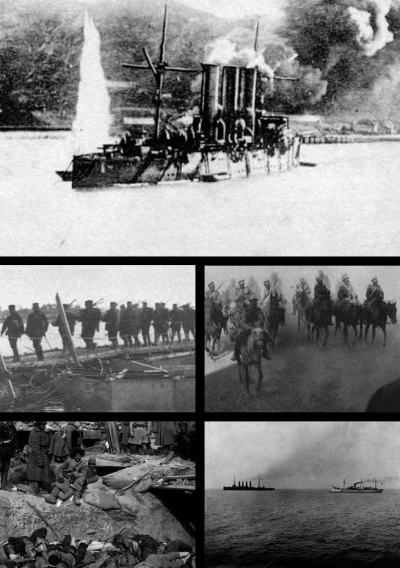The Battle of the Yellow Sea (Japanese: , romanized: Kkai kaisen; Russian: ) was a major naval battle of the Russo-Japanese War, fought on 10 August 1904. In the Russian Navy, it was referred to as the Battle of 10 August. The battle foiled an attempt by the Russian fleet at Port Arthur to break out and form up with the Vladivostok squadron, forcing them to return to port. Four days later, the Battle off Ulsan similarly ended the Vladivostok group's sortie, forcing both fleets to remain at anchor.
The Russo-Japanese War ( Japanese: 日露戦争, romanized: Nichiro sensō, lit. 'Japanese-Russian War';Russian: Ру́сско-япóнская войнá, romanized: Rússko-yapónskaya voyná) was fought between the Empire of Japan and the Russian Empire during 1904 and 1905 over rival imperial ambitions in Manchuria and the Korean Empire. The major theatres of military operations were located in Liaodong Peninsula and Mukden in Southern Manchuria, and the seas around Korea, Japan, and the Yellow Sea.
Russia sought a warm-water port on the Pacific Ocean both for its navy and for maritime trade. Vladivostok remained ice-free and operational only during the summer; Port Arthur, a naval base in Liaodong Province leased to Russia by the Qing dynasty of China from 1897, was operational year round. Since the end of the First Sino-Japanese War in 1895, Japan had feared Russian encroachment would interfere with its plans to establish a sphere of influence in Korea and Manchuria. Russia had pursued an expansionist policy east of the Urals, in Siberia and the Far East, since the reign of Ivan the Terrible in the 16th century.Seeing Russia as a rival, Japan offered to recognize Russian dominance in Manchuria in exchange for recognition of Korea as within the Japanese sphere of influence. Russia refused and demanded the establishment of a neutral buffer zone between Russia and Japan in Korea north of the 39th parallel. The Imperial Japanese Government perceived this as obstructing their plans for expansion into mainland Asia and chose to go to war. After negotiations broke down in 1904, the Imperial Japanese Navy opened hostilities in a surprise attack on the Russian Eastern Fleet at Port Arthur, China on 9 February [O.S. 27 January] 1904.
Although Russia suffered a number of defeats, Emperor Nicholas II remained convinced that Russia could still win if it fought on; he chose to remain engaged in the war and await the outcomes of key naval battles. As hope of victory dissipated, he continued the war to preserve the dignity of Russia by averting a "humiliating peace". Russia ignored Japan's willingness early on to agree to an armistice and rejected the idea of bringing the dispute to the Permanent Court of Arbitration at the Hague. The war was eventually concluded with the Treaty of Portsmouth (5 September [O.S. 23 August] 1905), mediated by US President Theodore Roosevelt. The complete victory of the Japanese military surprised international observers and transformed the balance of power in both East Asia and Eastern Europe, resulting in Japan's emergence as a great power and a decline in the Russian Empire's prestige and influence in eastern Europe. Russia's incurrence of substantial casualties and losses for a cause that resulted in humiliating defeat contributed to a growing domestic unrest which culminated in the 1905 Russian Revolution, and severely damaged the prestige of the Russian autocracy. The war also marked the first victory of an Asian country against a Western power in modern times.

1904Aug, 10
Russo-Japanese War: The Battle of the Yellow Sea between the Russian and Japanese battleship fleets takes place.
Choose Another Date
Events on 1904
- 17Jan
The Cherry Orchard
Anton Chekhov's The Cherry Orchard receives its premiere performance at the Moscow Art Theatre. - 3Mar
Thomas Edison
Kaiser Wilhelm II of Germany becomes the first person to make a sound recording of a political document, using Thomas Edison's phonograph cylinder. - 8Apr
The Book of the Law
British mystic Aleister Crowley transcribes the first chapter of The Book of the Law. - 5May
Cy Young
Pitching against the Philadelphia Athletics at the Huntington Avenue Grounds, Cy Young of the Boston Americans throws the first perfect game in the modern era of baseball. - 16Nov
Vacuum tube
English engineer John Ambrose Fleming receives a patent for the thermionic valve (vacuum tube).

 English
English  español
español  français
français  português
português  русский
русский  العربية
العربية  简体中文
简体中文 